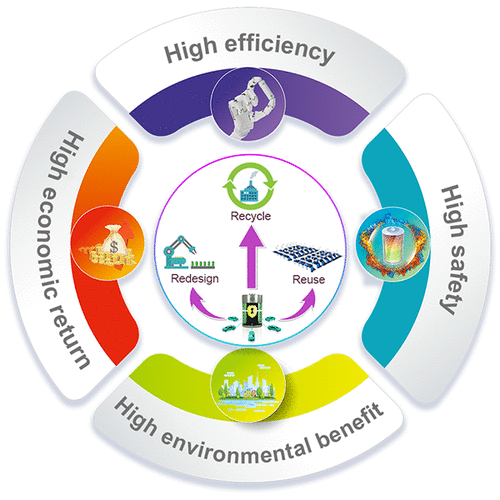当前位置:
X-MOL 学术
›
Chem. Rev.
›
论文详情
Our official English website, www.x-mol.net, welcomes your
feedback! (Note: you will need to create a separate account there.)
Sustainable Recycling Technology for Li-Ion Batteries and Beyond: Challenges and Future Prospects.
Chemical Reviews ( IF 51.4 ) Pub Date : 2020-01-28 , DOI: 10.1021/acs.chemrev.9b00535 Ersha Fan 1 , Li Li 1, 2 , Zhenpo Wang 2, 3 , Jiao Lin 1 , Yongxin Huang 1 , Ying Yao 1 , Renjie Chen 1, 2 , Feng Wu 1, 2
Chemical Reviews ( IF 51.4 ) Pub Date : 2020-01-28 , DOI: 10.1021/acs.chemrev.9b00535 Ersha Fan 1 , Li Li 1, 2 , Zhenpo Wang 2, 3 , Jiao Lin 1 , Yongxin Huang 1 , Ying Yao 1 , Renjie Chen 1, 2 , Feng Wu 1, 2
Affiliation

|
Tremendous efforts are being made to develop electrode materials, electrolytes, and separators for energy storage devices to meet the needs of emerging technologies such as electric vehicles, decarbonized electricity, and electrochemical energy storage. However, the sustainability concerns of lithium-ion batteries (LIBs) and next-generation rechargeable batteries have received little attention. Recycling plays an important role in the overall sustainability of future batteries and is affected by battery attributes including environmental hazards and the value of their constituent resources. Therefore, recycling should be considered when developing battery systems. Herein, we provide a systematic overview of rechargeable battery sustainability. With a particular focus on electric vehicles, we analyze the market competitiveness of batteries in terms of economy, environment, and policy. Considering the large volumes of batteries soon to be retired, we comprehensively evaluate battery utilization and recycling from the perspectives of economic feasibility, environmental impact, technology, and safety. Battery sustainability is discussed with respect to life-cycle assessment and analyzed from the perspectives of strategic resources and economic demand. Finally, we propose a 4H strategy for battery recycling with the aims of high efficiency, high economic return, high environmental benefit, and high safety. New challenges and future prospects for battery sustainability are also highlighted.
中文翻译:

锂离子电池的可持续回收技术及其超越:挑战和未来前景。
为了开发用于能量存储装置的电极材料,电解质和隔板,正在做出巨大的努力,以满足电动汽车,脱碳电和电化学能量存储等新兴技术的需求。但是,锂离子电池(LIB)和下一代可充电电池对可持续性的关注很少受到关注。回收在未来电池的整体可持续性中起着重要作用,并且受电池属性(包括环境危害及其组成资源的价值)的影响。因此,开发电池系统时应考虑回收。在此,我们提供了可充电电池可持续性的系统概述。特别关注电动汽车,我们从经济,环境和政策方面分析电池的市场竞争力。考虑到即将淘汰的大量电池,我们从经济可行性,环境影响,技术和安全性的角度全面评估电池的利用率和回收利用。讨论了电池寿命的生命周期评估,并从战略资源和经济需求的角度进行了分析。最后,我们提出了4H电池回收策略,旨在实现高效率,高经济回报,高环境效益和高安全性。还强调了电池可持续性的新挑战和未来前景。我们从经济可行性,环境影响,技术和安全的角度全面评估电池的利用率和回收利用。讨论了电池寿命的生命周期评估,并从战略资源和经济需求的角度进行了分析。最后,我们提出了4H电池回收策略,旨在实现高效率,高经济回报,高环境效益和高安全性。还强调了电池可持续性的新挑战和未来前景。我们从经济可行性,环境影响,技术和安全的角度全面评估电池的利用率和回收利用。讨论了电池寿命的生命周期评估,并从战略资源和经济需求的角度进行了分析。最后,我们提出了4H电池回收策略,旨在实现高效率,高经济回报,高环境效益和高安全性。还强调了电池可持续性的新挑战和未来前景。我们提出了一种4H电池回收策略,旨在实现高效率,高经济回报,高环境效益和高安全性。还强调了电池可持续性的新挑战和未来前景。我们提出了一种4H电池回收策略,旨在实现高效率,高经济回报,高环境效益和高安全性。还强调了电池可持续性的新挑战和未来前景。
更新日期:2020-01-28
中文翻译:

锂离子电池的可持续回收技术及其超越:挑战和未来前景。
为了开发用于能量存储装置的电极材料,电解质和隔板,正在做出巨大的努力,以满足电动汽车,脱碳电和电化学能量存储等新兴技术的需求。但是,锂离子电池(LIB)和下一代可充电电池对可持续性的关注很少受到关注。回收在未来电池的整体可持续性中起着重要作用,并且受电池属性(包括环境危害及其组成资源的价值)的影响。因此,开发电池系统时应考虑回收。在此,我们提供了可充电电池可持续性的系统概述。特别关注电动汽车,我们从经济,环境和政策方面分析电池的市场竞争力。考虑到即将淘汰的大量电池,我们从经济可行性,环境影响,技术和安全性的角度全面评估电池的利用率和回收利用。讨论了电池寿命的生命周期评估,并从战略资源和经济需求的角度进行了分析。最后,我们提出了4H电池回收策略,旨在实现高效率,高经济回报,高环境效益和高安全性。还强调了电池可持续性的新挑战和未来前景。我们从经济可行性,环境影响,技术和安全的角度全面评估电池的利用率和回收利用。讨论了电池寿命的生命周期评估,并从战略资源和经济需求的角度进行了分析。最后,我们提出了4H电池回收策略,旨在实现高效率,高经济回报,高环境效益和高安全性。还强调了电池可持续性的新挑战和未来前景。我们从经济可行性,环境影响,技术和安全的角度全面评估电池的利用率和回收利用。讨论了电池寿命的生命周期评估,并从战略资源和经济需求的角度进行了分析。最后,我们提出了4H电池回收策略,旨在实现高效率,高经济回报,高环境效益和高安全性。还强调了电池可持续性的新挑战和未来前景。我们提出了一种4H电池回收策略,旨在实现高效率,高经济回报,高环境效益和高安全性。还强调了电池可持续性的新挑战和未来前景。我们提出了一种4H电池回收策略,旨在实现高效率,高经济回报,高环境效益和高安全性。还强调了电池可持续性的新挑战和未来前景。











































 京公网安备 11010802027423号
京公网安备 11010802027423号